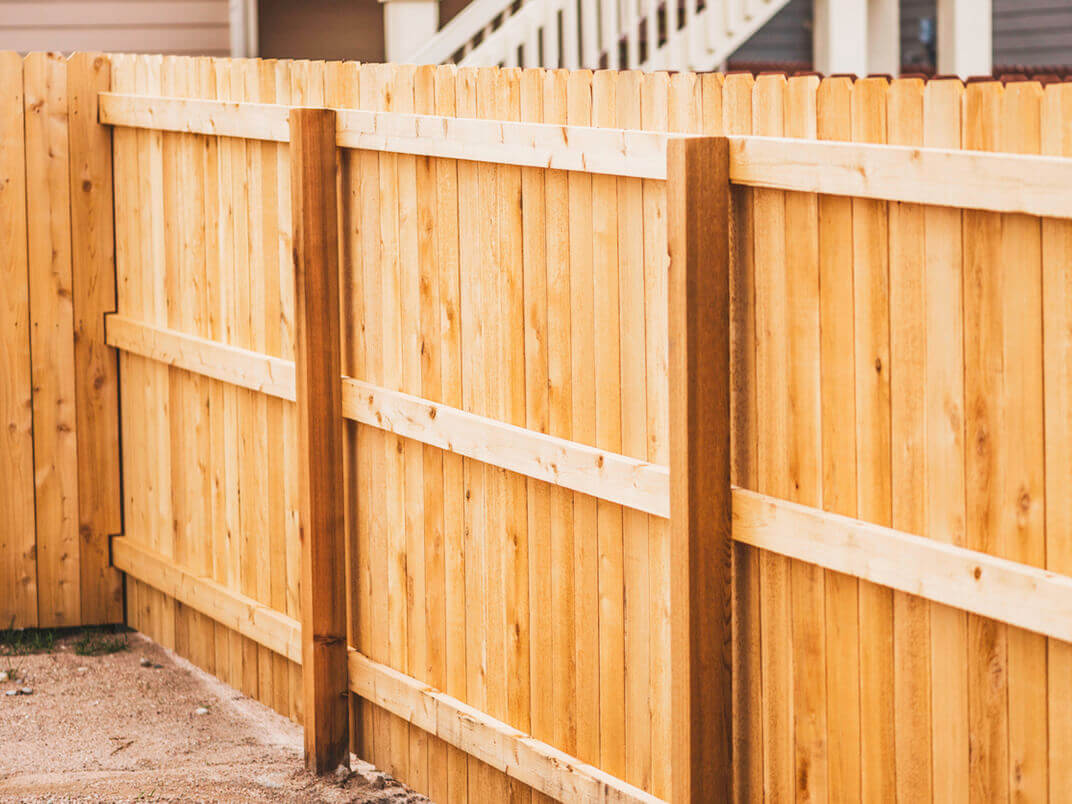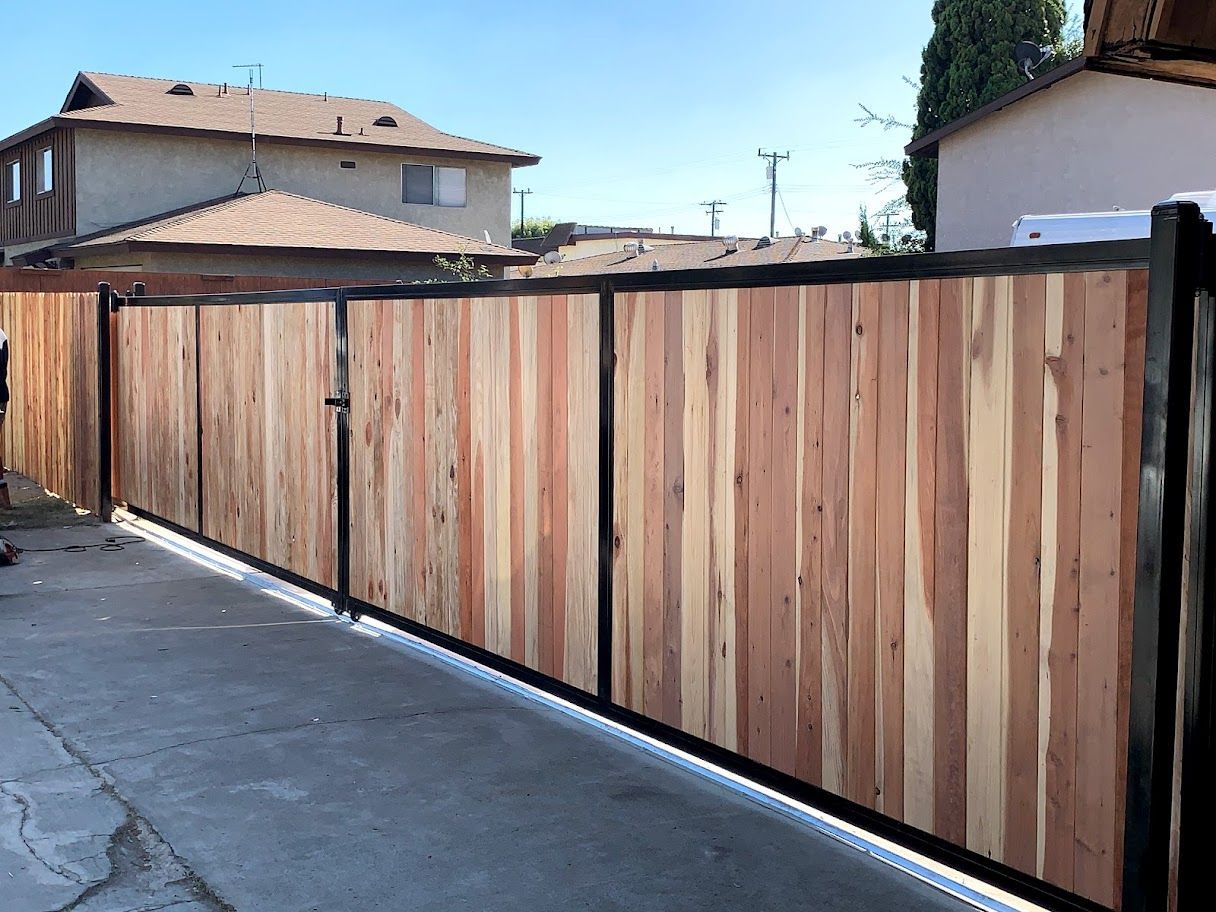All Categories
Featured
When picking a fencing for your property, it's crucial to take into consideration elements like cost, longevity, maintenance, and visual charm. Three of the most popular materials for residential and business fencings are wood, plastic, and aluminum.
Wood Fence. Pros:
![]()
All-natural Aesthetic: Timber fences are recognized for their traditional, natural look. They can conveniently blend right into the majority of landscapes and improve the appeal of your home or service. Whether you're intending for a rustic look or an extra refined finish, timber can be tailored with paint, discolor, or sealant. Modification: Wood is among one of the most flexible materials, permitting a broad selection of styles, such as picket fences, personal privacy fences, and ranch-style enclosures. It's simple to change the layout to fit the details requirements of your residential or commercial property. Inexpensive: Typically, timber fencings come with a reduced initial price compared to plastic or aluminum, making them an economical choice for those on a budget plan. Cons:
Upkeep Demands: Wood fencings need routine maintenance to keep their charm and performance. This includes staining or painting to protect against rot, termites, and climate damages. Without appropriate care, timber can degrade in time. Shorter Life-span: Compared to plastic or aluminum, wood fences tend to have a shorter life expectancy, specifically in areas with severe climate. Extreme conditions, such as hefty rain, moisture, or snow, can trigger wood to deteriorate quicker. Prone to Damage: Wood fences are prone to damage from bugs, including termites, along with all-natural wear from weather. They might also warp or split otherwise effectively preserved. Vinyl Fencing. Pros:
Reduced Upkeep: One of the major advantages of vinyl fencings is that they require marginal upkeep. Unlike timber, vinyl doesn't require to be painted, secured, or tarnished. It's immune to fading, discoloration, and cracking, which conserves time and cash on maintenance. Resilience: Plastic is understood for its ability to withstand severe weather without degrading. It's unsusceptible insects like termites, and its resistance to dampness and UV rays ensures it continues to be looking helpful for lots of years. Resilient: A vinyl fencing can last as much as three decades or more, making it an excellent long-term financial investment. Many manufacturers supply guarantees, better boosting its value. Variety of Styles: Vinyl fences are offered in numerous shades and styles, consisting of those that simulate timber. You can pick from privacy, picket, or decorative designs, supplying flexibility to match your home or organization. Cons:
![]()
Greater Upfront Price: Plastic fences tend to have a higher preliminary cost than timber. While the lasting savings on upkeep are substantial, the in advance investment may be a deterrent for some house owners. Limited Modification: Vinyl fencings can be found in basic designs, and while styles and colors are diverse, you may not have as much adaptability for personalization contrasted to timber. Splitting in Cold Climates: While plastic is resilient, in incredibly chilly environments, it can become fragile and crack upon effect, which might be problematic in areas with rough winters. Light weight aluminum Secure fencing. Pros:
Reduced Upkeep: Light weight aluminum fences are recognized for their low-maintenance demands. Unlike wood, light weight aluminum doesn't rust or wear away, and it does not require to be repainted or secured. This makes it a wonderful selection for those that desire a problem-free alternative. Sturdiness and Toughness: Light weight aluminum is a durable material that stands well to harsh climate conditions. It's an exceptional selection for seaside locations where saltwater rust is a worry, as it's resistant to rust. Aesthetic Allure: Aluminum fencings supply a clean, classy appearance, often utilized for ornamental functions. They're offered in different designs, consisting of ornamental styles, and can add a premium feel to your residential or commercial property. Security: Light weight aluminum fencings are resilient and offer fantastic safety and security, especially when installed with gateways or locks. Their durable building offers a reliable obstacle against undesirable entrance. Cons:
![]()
Greater First Expense: Aluminum fences have a tendency to be more pricey than wood, especially if you select attractive layouts. The ahead of time price may be excessive for some. Much Less Privacy: Light weight aluminum fencings usually have larger voids in between the slats, which implies they give less privacy than timber or vinyl fencings. Light weight aluminum may not be the best option if privacy is a top priority. Nicking Problems: While light weight aluminum is rust-resistant, it is at risk to bending or nicking if struck with force. A lorry crash or hefty effect can cause lasting damage to the fencing. Which Fence Product is Right for You? Selecting the appropriate fencing depends upon several factors, including your spending plan, design preferences, upkeep capacity, and the environment in which you live. Timber may be the right option if you desire a natural appearance and are prepared for normal upkeep. If low-maintenance and long life are your top priorities, vinyl is a fantastic selection. For those that like a smooth, contemporary appearance with minimal care, light weight aluminum provides a lasting, secure remedy.
Eventually, each fence material has its pros and cons, so it is very important to review what matters most for your particular needs. Consider the climate, the degree of privacy you call for, and how much maintenance you want to devote to, and you'll find the best fencing for your residential or commercial property.
Wood Fence. Pros:

All-natural Aesthetic: Timber fences are recognized for their traditional, natural look. They can conveniently blend right into the majority of landscapes and improve the appeal of your home or service. Whether you're intending for a rustic look or an extra refined finish, timber can be tailored with paint, discolor, or sealant. Modification: Wood is among one of the most flexible materials, permitting a broad selection of styles, such as picket fences, personal privacy fences, and ranch-style enclosures. It's simple to change the layout to fit the details requirements of your residential or commercial property. Inexpensive: Typically, timber fencings come with a reduced initial price compared to plastic or aluminum, making them an economical choice for those on a budget plan. Cons:
Upkeep Demands: Wood fencings need routine maintenance to keep their charm and performance. This includes staining or painting to protect against rot, termites, and climate damages. Without appropriate care, timber can degrade in time. Shorter Life-span: Compared to plastic or aluminum, wood fences tend to have a shorter life expectancy, specifically in areas with severe climate. Extreme conditions, such as hefty rain, moisture, or snow, can trigger wood to deteriorate quicker. Prone to Damage: Wood fences are prone to damage from bugs, including termites, along with all-natural wear from weather. They might also warp or split otherwise effectively preserved. Vinyl Fencing. Pros:
Reduced Upkeep: One of the major advantages of vinyl fencings is that they require marginal upkeep. Unlike timber, vinyl doesn't require to be painted, secured, or tarnished. It's immune to fading, discoloration, and cracking, which conserves time and cash on maintenance. Resilience: Plastic is understood for its ability to withstand severe weather without degrading. It's unsusceptible insects like termites, and its resistance to dampness and UV rays ensures it continues to be looking helpful for lots of years. Resilient: A vinyl fencing can last as much as three decades or more, making it an excellent long-term financial investment. Many manufacturers supply guarantees, better boosting its value. Variety of Styles: Vinyl fences are offered in numerous shades and styles, consisting of those that simulate timber. You can pick from privacy, picket, or decorative designs, supplying flexibility to match your home or organization. Cons:

Greater Upfront Price: Plastic fences tend to have a higher preliminary cost than timber. While the lasting savings on upkeep are substantial, the in advance investment may be a deterrent for some house owners. Limited Modification: Vinyl fencings can be found in basic designs, and while styles and colors are diverse, you may not have as much adaptability for personalization contrasted to timber. Splitting in Cold Climates: While plastic is resilient, in incredibly chilly environments, it can become fragile and crack upon effect, which might be problematic in areas with rough winters. Light weight aluminum Secure fencing. Pros:
Reduced Upkeep: Light weight aluminum fences are recognized for their low-maintenance demands. Unlike wood, light weight aluminum doesn't rust or wear away, and it does not require to be repainted or secured. This makes it a wonderful selection for those that desire a problem-free alternative. Sturdiness and Toughness: Light weight aluminum is a durable material that stands well to harsh climate conditions. It's an exceptional selection for seaside locations where saltwater rust is a worry, as it's resistant to rust. Aesthetic Allure: Aluminum fencings supply a clean, classy appearance, often utilized for ornamental functions. They're offered in different designs, consisting of ornamental styles, and can add a premium feel to your residential or commercial property. Security: Light weight aluminum fencings are resilient and offer fantastic safety and security, especially when installed with gateways or locks. Their durable building offers a reliable obstacle against undesirable entrance. Cons:

Greater First Expense: Aluminum fences have a tendency to be more pricey than wood, especially if you select attractive layouts. The ahead of time price may be excessive for some. Much Less Privacy: Light weight aluminum fencings usually have larger voids in between the slats, which implies they give less privacy than timber or vinyl fencings. Light weight aluminum may not be the best option if privacy is a top priority. Nicking Problems: While light weight aluminum is rust-resistant, it is at risk to bending or nicking if struck with force. A lorry crash or hefty effect can cause lasting damage to the fencing. Which Fence Product is Right for You? Selecting the appropriate fencing depends upon several factors, including your spending plan, design preferences, upkeep capacity, and the environment in which you live. Timber may be the right option if you desire a natural appearance and are prepared for normal upkeep. If low-maintenance and long life are your top priorities, vinyl is a fantastic selection. For those that like a smooth, contemporary appearance with minimal care, light weight aluminum provides a lasting, secure remedy.
Eventually, each fence material has its pros and cons, so it is very important to review what matters most for your particular needs. Consider the climate, the degree of privacy you call for, and how much maintenance you want to devote to, and you'll find the best fencing for your residential or commercial property.
Latest Posts
Learn About Premier Auto Repair Care in Chicago – Drive with Confidence
Published May 28, 25
1 min read
Why Chicago Drivers Trust Montclare Auto Repair for Trusted Service and Big Savings
Published May 25, 25
1 min read
Find Budget-Friendly Auto Repairs with Montclare’s Monthly Service Specials
Published May 23, 25
1 min read
More
Latest Posts
Learn About Premier Auto Repair Care in Chicago – Drive with Confidence
Published May 28, 25
1 min read
Why Chicago Drivers Trust Montclare Auto Repair for Trusted Service and Big Savings
Published May 25, 25
1 min read
Find Budget-Friendly Auto Repairs with Montclare’s Monthly Service Specials
Published May 23, 25
1 min read